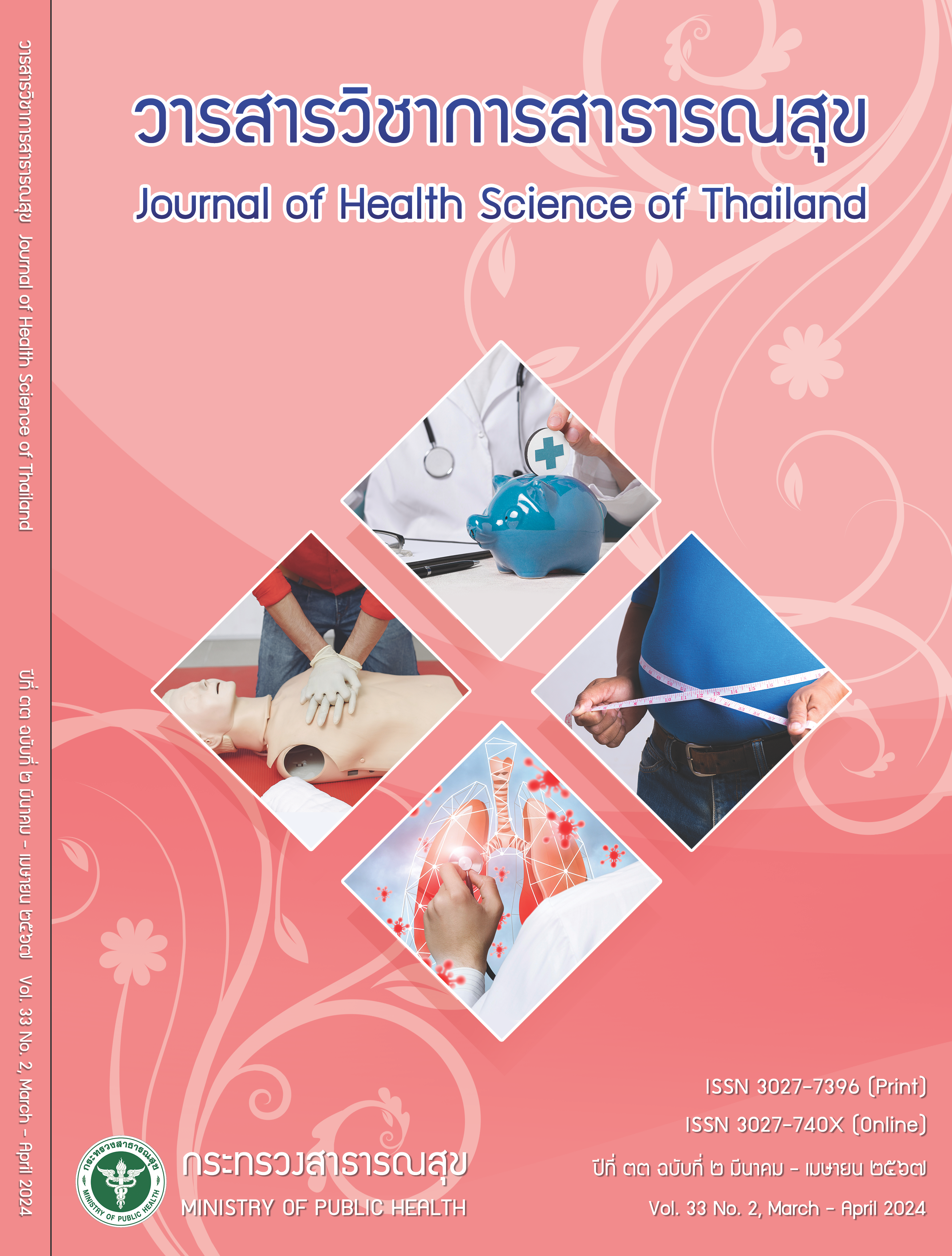ประสิทธิผลของโปรแกรมการแสดงสื่อสาระเพื่อเสริมสร้างทักษะพลังแห่งการฟื้นตัวของวัยรุ่น ในศูนย์ฝึกและอบรมเด็กและเยาวชนเขต 2 จังหวัดราชบุรี
คำสำคัญ:
การแสดงสื่อสาระ, พลังแห่งการฟื้นตัว, วัยรุ่นและเยาวชนบทคัดย่อ
การวิจัยกึ่งทดลองแบบกลุ่มเดียวก่อน-หลังครั้งนี้ ดำเนินการในศูนย์ฝึกและอบรมเด็กและเยาวชนเขต 2 จังหวัดราชบุรี มีวัตถุประสงค์เพื่อศึกษาประสิทธิผลของโปรแกรมการแสดงสื่อสาระเพื่อเสริมสร้างทักษะพลัง แห่งการฟื้ นตัวของวัยรุ่น (Resilience Lecture Performance Program - RLPP) กับเยาวชนผู้ยินดีเข้าร่วม โครงการโดยสมัครใจจำนวน 50 คน โปรแกรม RLPP พัฒนาขึ้นโดยผู้วิจัย ประกอบด้วยเนื้อหาหลัก 4 ส่วน (12 ชั่วโมง) และประเมินด้วยแบบประเมินความเข้มแข็งทางใจในเด็ก (Resilience Scale – RS-48, 13-18 years) ผลการวิจัย พบว่า ทักษะพลังแห่งการฟื้ นตัวของวัยรุ่นมีการเพิ่มขึ้นอย่างมีนัยสำคัญทางสถิติ คะแนน ทักษะพลังแห่งการฟื้ นตัวหลังดำเนินกิจกรรม (ค่าคะแนน 77.22±8.10) เปรียบเทียบกับคะแนนก่อนการ ทดสอบ (ค่าคะแนน 70.85±7.73) เมื่อพิจารณาตามองค์ประกอบ 4 ด้าน พบว่า ความสามารถทางสังคม ความสามารถในการแก้ไขปัญหา และความสามารถในการตั้งจุดมุ่งหมายในชีวิต มีทิศทางเพิ่มขึ้นอย่างมี นัยสำคัญทางสถิติ ยกเว้นความสามารถในการดูแลและความสามารถในการควบคุมตัวเอง ซึ่งมีแนวโน้มเพิ่มขึ้น เพียงเล็กน้อยและไม่มีนัยสำคัญทางสถิติ โปรแกรมการแสดงสื่อสาระสามารถลดสัดส่วนของวัยรุ่นที่มีทักษะ พลังแห่งการฟื้ นตัวในระดับน้อย (ร้อยละ 13.04 เป็นร้อยละ 4.35) ลดสัดส่วนของกลุ่มที่อยู่ในระดับกลาง (ร้อยละ 86.96 เป็นร้อยละ 71.74) และเพิ่มสัดส่วนของกลุ่มที่อยู่ในระดับสูง (ร้อยละ 0.00 เป็นร้อยละ 23.91)
Downloads
เอกสารอ้างอิง
American Psychological Association. APA dictionary of psychology [Internet]. 2022 [cited 2023 Sep 14]; Available from: https://www.apa.org/topics/resilience
Dallas JC, Jullamate P, Vatanasin D, Moungkum S, Nadarajan S, Krungkraipetch N. Resilience and influencing factors among youths undergoing substance abuse treatment in Thailand: a cross-sectional study. SAGE Open Nursing [Internet]. 2023 [cited 2024 Jan 15];9:1- 9. Available from: https://doi.org/10.1177/237796 08231157986
Carver CS. Resilience and thriving: issues, models, and linkages. J Soc Issues 1998;54(2):245–66.
Meichenbaum D, Calhoun LG, Tedeschi RG. Handbook of post-traumatic growth: research and practice. Mahwah: Lawrence Erlbaum; 2006.
Windle G. What is resilience? A review and concept analysis. Rev Clinical Gerontol 2011;21(2):152-69.
Li Y, Wang K, Yin Y, Li Y, Li S. Relationships between family resilience, breast cancer survivors’ individual resilience, and caregiver burden: a cross-sectional study. Int J Nurs Stud [Internet]. 2018 [cited 2024 Jan 9]; 88:79-84. Available from: doi: 10.1016/j.ijnurstu. 2018.08.011.
Masten AS. Resilience in developing systems: progress and promise as the fourth wave rises. Development and Psychopathology 2007;19(3):921–30.
La-oh JL., Achankeng ND. Resilience effects on the self-development of adolescents in secondary schools in Kumba, Cameroon. Int J Arts Humanit Soc Stud 2021. 3(5):103-14.
Bitsika V, Sharpley CF, Bell R. The buffering effect of resilience upon stress, anxiety and depression in parents of a child with an autism spectrum disorder. J Dev Phys Disabil 2013;25:533–43.
Campbell-Sills L, Cohan SL, Stein MB. Relationship of resilience to personality, coping, and psychiatric symptoms in young adults. Behav Res Ther 2006;44: 585– 99.
Cao F, Li J, Xin W, Yang Z, Wu D. The impact of resilience on the mental health of military personnel during the COVID-19 pandemic: coping styles and regulatory focus. Front. Public Health [Internet]. 2023 [cited 2024 Jan 12];11:1-9. Available from: doi:10.3389/ fpubh.2023.1240047.
Songprakun W, McCann TV. Effectiveness of a self-helpmanual on the promotion of resilience in individuals with depression in Thailand: a randomized controlled trial. BMC Psychiatry [Internet]. 2012 [cited 2024 Jan 9];12(12):1-10. Available from: https://doi. org/10.1186/1471-244X-12-12.
Loprinzi CE, Prasad K, Schroeder DR, Sood A. Stress Management and Resilience Training (SMART) program to decrease stress and enhance resilience among breast cancer survivors: a pilot randomized clinical trial. Clin Breast Cancer. 2011;11(6):364–8.
Mealer M, Conrad D, Evans J, Jooste K, Solyntjes J, Rothbaum B, Moss M. Feasibility and acceptability of a resilience training program for intensive care unit nurses. Am J Crit Care [Internet]. 2014 [cited 2024 Jan 9];23(6):97-105. Available form: doi: 10.4037/ ajcc2014747.
Yu X, Stewart SM, Chui JPL, Ho JLY, Li ACH, Lam TH. A pilot randomized controlled trial to decrease adaptation difficulties in Chinese new immigrants to Hong Kong. Behav Ther 2014;45(1):137–52.
Bennett JB, Aden CA, Broome K, Mitchell K, Rigdon WD. Team resilience for young restaurant workers: research-to-practice adaptation and assessment. J Occup Health Psychol [Internet]. 2010 [cited 2024 Jan 6];15(3):223-36. Available from: doi: 10.1037/ a0019379.
Duckworth AL, Peterson C, Matthews MD, Kelly DR. Grit: perseverance and passion for long-term goals. J Pers Soc Psychol [Internet]. 2007 [cited 2024 Jan 6];92(6):1087-101. Available from: http://doi. org/10.1037/0022-3514.92.6.108
Masten AS, Cicchetti D. Resilience in development: progress and transformation. In: Cicchetti D, editor. Developmental psychopathology, risk, resilience, and intervention. 3rd ed. New York. John Wiley & Sons; 2016. p 271-333.
Masten AS. Global perspectives on resilience in children and youth. Child Dev [Internet]. 2014 [cited 2024 Jan 8];85(1):6–20. Available from: doi: 10.1111/ cdev.12205.
Herberg M, Torgersen GE. Resilience competence face framework for the unforeseen: relations, emotions, and cognition. a qualitative study. Front Psychol [Internet]. 2021 [cited 2024 Jan 8];12:1-24. Available from: https://doi.org/10.3389/fpsyg.2021.669904
กรมพินิจและคุ้มครองเด็กและเยาวชน. รายงานสถิติคดี ประจำปี พ.ศ. 2565 [อินเทอร์เน็ต]. 2565 [สืบค้นเมื่อ 20 กันยายน 2566]. แหล่งข้อมูล : https://www.djop.go.th/ storage/files/2
Kitchenham A. The Evolution of John Mezirow’s transformative learning theory. J Transf Educ. [Internet]. 2008 [cited 2023 Dec 19];6(2):104-23. Available from: doi: 10.1177/1541344608322678
Dix M. The cognitive spectrum of transformative learning. J Transf Educ [Internet]. 2016 [cited 2023 Dec 19];14(2):139–162. Available from: https://doi. org/10.1177/1541344615621951
Malkki K. Building on Mezirow’s theory of transformative learning: theorizing the challenges to reflection. J Transf Educ [Internet]. 2010 [cited 2023 Dec 19];8(1):42–62. Available from: https://doi.org/ 10.1177/1541344611403315
Boonpleng W, Borman S, Sukontapan P, Srisomboon P, Pratuangjitr L. Efficacy of life skill improvement program on preventing drug abuse in early teens. J Nurs Educ 2018;11(2):46-60
Ruetathip N, Rujirachakorn S. Study of the outcome of mental strength development program in adolescents by the resilient development program for teenagers. Journal of Sakhon Nakorn Hospital 2022;25(2):54-62. (in Thai)
Masten AS, Barnes AJ. Resilience in children: developmental perspectives. Children [Internet]. 2018 [cited 2023 Dec 29];5(7):2-16. Available from: doi: 10.3390/children5070098
Nietzsche F. The birth of tragedy. New York: Oxford University Press; 2001.
Nussbaum M. Poetic justice: The literary imagination and public life. Boston: Beacon Press;1995.
Halliwell S. The aesthetics of mimesis: Ancient texts and modern problems. New jersey: Princeton University Press; 2002.
ดาวน์โหลด
เผยแพร่แล้ว
วิธีการอ้างอิง
ฉบับ
บท
การอนุญาต
ลิขสิทธิ์ (c) 2024 กระทรวงสาธารณสุข

This work is licensed under a Creative Commons Attribution-NonCommercial-NoDerivatives 4.0 International License.







